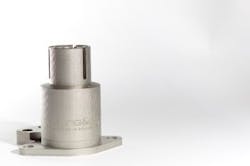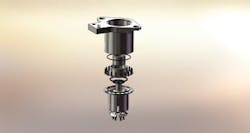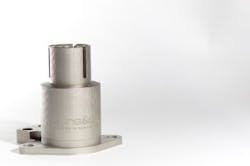Beverage plants could benefit from spare metal parts made using additive manufacturing
Metal components maker Jung & Co. Gerätebau (Kummerfeld, Germany), which specializes in stainless steel, titanium, and aluminum parts, relies on additive manufacturing (also known as 3D printing) to ensure availability of spare parts to beverage filling plants. The company is collaborating with additive manufacturing technology pioneer Concept Laser (Lichtenfels, Germany) to find such solutions.
The food and beverage industry is under pressure to keep up with production rates of around 40,000 to 80,000 cans or bottles per hour, so if, for example, a filler valve on a machine fails, it can cause a major loss of production. Waiting for the spare part to be manufactured and replaced could take days or even weeks, halting production until the part is ready. Depending on the size and output of the entire filling line, an hour of lost production may cost from €4000 to €30,000 (over $4200 to over $31,000), not to mention the stress caused and impact on other machines. With additive manufacturing, though, a component can be manufactured separately or as a whole within a week compared to 8-10 weeks with traditional methods.
The filler valve shown above replaces a conventionally manufactured part made up of multiple components. Owing to the demands of pressure and load on the valve, the replacement part, which was made using additive manufacturing, had to be thoroughly tested to prove that it could replace the function of the original. The part was manufactured on Concept Laser's M2 cusing Multilaser machine, resulting in a component produced directly from CAD data being manufactured promptly as a single item with no assembly work required. Thomas Lehmann, managing director of Jung & Co., says that the finished part not only looks different to the conventional one, but is also 35% lighter.
For more information, please visit www.jung-co.de/en and www.conceptlaserinc.com.


